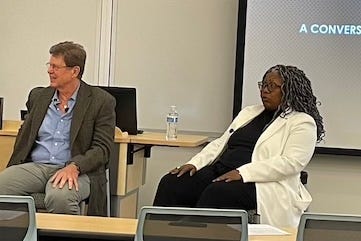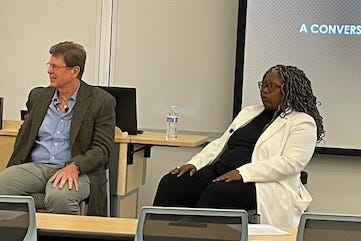As I wrote in my last newsletter, Friday night I drove downtown for an event at CU-Denver. It was co-sponsored by the UCCS Center for the Study of Evangelicalism (which I’ve written about before). Once there I learned of the many other co-sponsors and that the event coincided with the Regional Meetings of the American Academy of Religion which were happening at the University of Denver.
Randall Balmer is the John Phillips Professor of Religion at Dartmouth and the author of Bad Faith and Redeemer (a biography of Jimmy Carter with an updated edition came out last year). Anthea Butler is the Geraldine R. Segal Professor in American Social Thought at the University of Pennsylvania and the author of White Evangelical Racism. Both are historians by training.
The event was titled “White Christian Nationalism and the Future of American Politics”. There were probably around 100 people present (which isn’t bad for a Friday night when there was a Nuggets game next door). Video of the event should be up on the CSE webpage in the near future.
While I wasn’t taking notes, I came away with the sense that the conversation split the two ideas in the title. There was talk of Project 2025 and the first eight weeks of Trump 2.0. There was also a good historical examination of how we got here.
Anthea explained why all three descriptors in the title were important: White, Christian, and Nationalism. It’s possible for people to believe Christian faith should shape governmental policy without being advocates of WCN.
What makes the adherents stand out is the assumption of hierarchy. Who should be in control of the levers of society? Answer: Whites (not “others”), Christians (meaning evangelicals and conservative Catholics and not “cultural Christians or atheists”), and Americans (not “immigrants”). She mentioned in passing that this is also related to patriarchy, so we can throw Men (not “women” and not “LGBTQ+”) into the mix.
Randall spoke of the role of race in the founding of the Moral Majority and the damaging role played by Paul Weyrich (who went on to found the Heritage Foundation). The White Southern Christian contingent was far more interested in a Christian Nationalism. I learned that the Confederate government actually wrote allegiance to God and belief in Jesus as Savior into their Constitution.
He was on my imagined bingo sheet, so I knew it was only a matter of time until David Barton’s name came up. His role in crafting a mythology about the faith of the founding fathers cannot be overstated. Randall said that he thought that no more than two of the signers of our founding documents would be accepted in an evangelical church today.
As is usually the case when we get to Q&A, I had an observation and a question. Drawing upon the sociological survey literature about Christian Nationalism, I observed that the surveys distinguish between Ambassadors for and Accommodators to CN. The former are all-in while the latter share some general sentiments of CN.
This is an observation I’ve made since I first read Whitehead and Perry’s Taking America Back for God. Those who argue for a more rabid version of Christian Nationalism are having a significant impact — whether it’s the New Apostolic Reformation or events by Michael Flynn and Charlie Kirk or Patriot Churches — they are unabashed in their view that White Christian Conservative Male Americans should be controlling things. But there is this adjacent set of folks who say “we want our moral issues addressed” or “we want protection from secular influences”. Whitehead and Perry report the percentage of Ambassadors at 20% with that of Accommodators just over 30%.
The success of Christian Nationalism depends upon the Accommodators providing cover for the more strident form offered up by the Ambassadors. Because they hold a milder view arguing for Christian influence, they provide safe terrain. Attack them and it’s like saying “Christians should have no voice”. Which the Ambassadors can leverage for their cause.
I promise, my setup wasn’t this long! But I suggested that the key to countering Christian Nationalism is to shift the views of the Accommodators. How might we do that?
Randall gave a brief discourse on the importance of religious freedom and first amendment guarantees. He described the role of Roger Williams in arguing against the religious demands of Puritan Massachusetts and argued for “the separation of church and state” (Barton and Boebert don’t talk about him!). That separation was essential to protect freedom of belief from governmental control. So what we need is an argument for why religious freedom and the commitment to pluralistic democracy runs counter to Christian Nationalism.
Making that argument won’t be easy. This morning Ryan Burge reported on data that shows why this is so hard. He was examining a data set from part of the Cooperative Election Study that explored the salience of identity in terms of gender, race, and religion. As always, he looked at this in a variety of ways. But here is what he found when he examined the salience of religious identity by religious group.
As he writes: “Man, this graph is a great example of the peculiarity of American evangelicalism”. It’s not hard to take that 77% figure and connect it to beliefs that Christians are discriminated against, that “others” are taking control of institutions, and that one’s personal identity is therefore at stake.
So I think Randall Balmer is right in advocating for religious freedom. Anthea Butler is right that this is about in-group control and out-group exclusion. Yet changing the narrative is still important. It may just have to be Mainlines and Catholics who lead the way.






I have probably shared this with you before. But when Marjorie Taylor Greene originally ran for congress, she claimed my former church as her church home. She claimed that she was a small group leader and active. I asked around and she had gone there. She had been baptized and had volunteered with (although not led) small group that were for people with questions about Christianity.
I kept asking questions and talking to friends who were on staff. After they did a little digging they came back and said that there was no evidence she participated in the church at all for about 7-8 years prior to her running for election.
I suggested that if the church was trying to actively address racial issues (they were) and they wanted to not be tied to her claiming to be a member of the church, they needed to invite a friendly reporter to do a story about something else and get the reporter to ask about her claim to be a member of the church. They don't have to disassociate from her, they just needed to say, she had not been an active attender for several years.
The church leadership was unwilling to take that level of statement. There were other things than just that, but effectively the work on racial justice issues stopped not long after and several staff left or changed jobs.
It was a very real example back in 2020, accomodators covering for ambassadors. There were other reasons in addition to that about why I left the church. But white christian nationalism not being a bridge too far was certainly part of the reason we left.